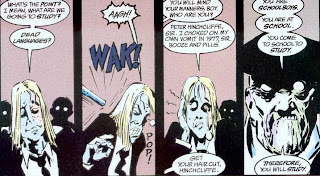It's an interesting episode in a series that isn't afraid of tackling such subjects as
- what is really real and what is imaginary
- the various prisons we make for ourselves, especially through fear about our appearance
- the perversions that, say, greedy men, serial killers or ancient faeries or forgotten Greek gods enjoy
- where real genius comes from
- and, here, the nature of hell.
Sandman 25 is a story which stands apart from the main storyline about Morpheus, otherwise known as Dream, or the King of Dreams. Instead, it's a parable about letting go of an evil past, which follows a English school-boy who is unwanted by his teachers, left behind at his boarding school by his only surviving parent. This character comes to epitomise the unwanted person who is oppressed and made to fit into boxes for convenience, or bullied for the pleasure of evil-doers.
As he meets the ghosts of past students and teachers he sees them meaninglessly reliving their past unhappy lives, and his eventual “escape” from the school seems to me to be an exploration of leaving behind a history of psychologically damaging abuse.
Wonderfully, in the end, the pattern of others' damaging behaviour does not have to control this boy; he is individual – in a sense, when he leaves the school, he triumphs over the system. Although they have taken a lot from him, the boy is still able to become a man, responsible and engaging in the world more-or-less in a way of his choosing.
The story cleverly shows us the implication of what has recently happened to Dream, who has been duped by Lucifer, the king of hell – because it shows the reversal of nature as the dead haunt the living as damned (or unlucky?) souls are released from hell. As the school-boy and his oppressed (un?)dead companion leave, they talk about whether hell is something we make for ourselves and whether hell is a place or not. They conclude by suggesting that hell is a place (ie. the school) but “you don't have to stay anywhere for ever”.
 The positive event of the two companions leaving the evil characters in the school behind faintly recalls the unsettling events of Sandman 23. Here, the Sandman version of Lucifer shows he can leave hell, turfing the demons and evil men and women out into limbo or the world, saying they have suffered enough in hell. This kind of liberation seems wonderful at first, but appears sinister when souls start returning to haunt the world and proud psychopaths, who know they should be punished, are freed.
The positive event of the two companions leaving the evil characters in the school behind faintly recalls the unsettling events of Sandman 23. Here, the Sandman version of Lucifer shows he can leave hell, turfing the demons and evil men and women out into limbo or the world, saying they have suffered enough in hell. This kind of liberation seems wonderful at first, but appears sinister when souls start returning to haunt the world and proud psychopaths, who know they should be punished, are freed.The role of God in people's lives
The school-boy, Charles Rowland, teaches us about experiencing life and taking action to prevent falling into becoming a victim of depraved patterns of living. But where is God in this story? He acts at points later on to deal with the problems caused by Lucifer. But he isn't shown to take care of the victims, to care for people's souls, to care for the individuals in the story. Here, he is less than invisible: he is absent from the lives of ordinary people!
Instead we have the liberal myth rearing its head saying that expressing oneself and defying authority brings true liberation in life. OK, so I agree that where authority groups are evil they need to be opposed fiercely, and the comic is right that liberation is needed, and broken lives can really be helped by others' love and care and a good environment for healing.
But as a Christian I know that God's role is more. He loves us! And he is good. And we are to mimic and follow him. It's his role to oppose evil, to liberate people from evil through his Son, to work in power to bring justice one day by judging the living and the dead. God holds the key to hell and God says who goes there because of their sin. God goes out of his way to call people into his kingdom of light, to be able to enjoy eternity with him in heaven and ultimately in a new perfect, brilliant creation. God loves the marvellous people he has made and acts in the lives of the broken or oppressed people who make up his church – granting true comfort, peace, joy, relief, material help and a caring community which becomes a family and a help to those who are lost.
People do evil things and that's a problem. But God cares about us and brings help and freedom from sin for those who ask. Amen to that.



No comments:
Post a Comment